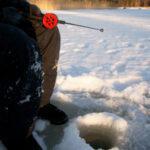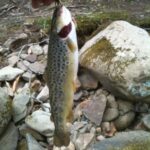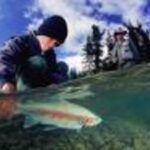Fish caught on a lake fall into three general headings: game fish, food fish, and forage or bait fish. Catching each one requires different equipment and/or bait.
Game fish such as bass, trout, pike, pickerel, muskellunge, pike perch, etc., all fall under the general heading of game fish. Each of these is valued for they’re sporting value. Anglers enjoy tournaments every year winning large sums of money for catching that one special game fish for that season.
Whereas catfish, perch, crappie, blue gill, some carp etc., have been considered as food fish. Even though this group of fish is not considered as the so-called game fish they do have recreational value. All one needs to do is find themselves fishing in a school of blue gill or crappie catching a fish a minute to know the true enjoyment of fishing.
Baitfish such as shad, minnows etc., are small fish caught in a sine or net and used as bait to catch larger fish. Not all states allow you to use live bait for fishing. You will need to check if it’s legal in your state when you purchase your fishing license.
If you are an old hand at fishing on a lake or a beginner it can prove to be extremely fun. For the novice it will be important to master the correct rigging, casting, type of bait etc., so one will get the best enjoyment possible from their experience. Therefore, here are some tips that could help the new angler master the art of lake fishing.
First knowing where the fish live, that is their habitat and what kinds of fish inhabit the lake you are fishing on will give you the edge to find your prey. Ask at the bait shop for Lake Maps and any information that will assist you in your quest.
Second. If you are fly-fishing remember that you are working the line not the fly. The fly is but a passenger, which is attached to the leader. Don’t snap the line like a whip or you’ll loose your fly. Instead use a smooth, snappy kind of stroke with the same type of movement as you would a whip but not as hard. Fly-fishing is an art onto itself and having the proper timing is one of the important factors in the backcast and forward cast.
Third. The most popular fishing on a lake is done mostly with larger, sturdy rods. Lake Fish can and do get
quite large with a large mouth bass weighing easily 12 pounds. The reason the fish can get so large is because of an abundance of rich food and safe habitat to grow in. Landing a large fish such as this will provide you with a lifetime of memories.
In order to handle catching this size of fish, the ideal length and weight of the rod is 8 ½ feet in length and from 4 to four and three quarters of an ounce in weight. Take your time and learn to cast with your rod and reel using a practice plug. Before long you will be able to land any cast exactly where you want it.
Lake fishing really is not difficult to master and with a little patience you will be coming home with your ice chest full of good eating lake trout or crappie. Or maybe you will have your own “You should of seen the one that got away” fishing story. No matter with little patience and practice, the novice can become a successful angler in the lake. I wish you many days of happy fishing.



